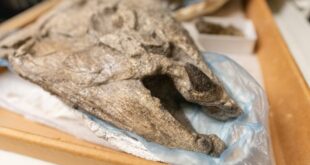Proposed that start of new epoch was 1950, when human impact accelerated

For the past two decades, geologists have wrestled with whether humans have changed the planet enough to kick off a completely new epoch in geological time called the Anthropocene. Now, a subcommittee of Earth scientists has reportedly made a decision: No, we haven't.
The results mean we're still living in the Holocene, an epoch that started with the end of the last ice age 11,700 years ago.
The Subcommission on Quaternary Stratigraphy (SQS) voted on the proposed Anthropocene epoch over the past month, and the results were released to subcommittee members on Tuesday, the New York Times reported. The newspaper saw the internal document listing the votes: 12 against, four in favour and two abstentions.
The SQS is a constituent body of the International Commission on Stratigraphy (ICS), which decides what divisions are included on the official geologic time scale, and when they begin and end.
A brief history of the Anthropocene
The proposal for the Anthropocene epoch was first popularized by the Dutch Nobel-prize-winning chemist, Paul Crutzen, in the early 2000s. In 2009, the ICS convened a group of geologists, paleontologists and other scientists called the Anthropocene Working Group.
"We were asked to determine whether or not there was evidence in the geologic record of that shift in the Earth system that this atmospheric chemist threw out there," said Francine McCarthy, a professor of Earth sciences at Brock University in St. Catharines, Ont., who was a group member. "And our answer was a resounding yes."
The scientists in the working group found evidence that the epoch started in 1950. That's when they say human impact on the planet accelerated, as seen in plastics, elemental aluminum (which is found only as ores in nature), black carbon from fossil fuel combustion and plutonium from hydrogen bomb tests, chosen as the "primary" marker for the start of the Anthropocene.
Some of the best preserved evidence was found in layers of sediment at the bottom of Crawford Lake in Milton, Ont., which was named last year as the proposed "golden spike" marking the start of the new proposed epoch.
'Validity of the vote' questioned
A statement from the Anthropocene Working Group emailed to CBC News on Tuesday said "there remain several issues that need to be resolved about the validity of the vote" and that until they're resolved, "it would be inappropriate to talk directly on this matter at present."
McCarthy said the group hasn't received any feedback on the evidence that was voted on — not even in the New York Times article.
"At least I would have liked to have read in the article that they found this unconvincing," she said.
Instead, subcommittee members pointed out that human impacts began well before 1950, with events such as the onset of agriculture or the Industrial Revolution.
What others scientists think
Some Canadian scientists who study the geological record in sediments and rocks aren't surprised by the results of the vote.
Joe Desloges, a professor in the geography and Earth sciences departments at the University of Toronto, said scientists have been debating the Anthropocene for well over a decade. "Which means it's not a slam dunk."
He said he hadn't anticipated the big majority of "no" votes. But he added that the geological time scale is typically set based on records in solid rocks, not sediments like those in Crawford Lake. "I think people are kind of skeptical about the permanency of it."

Boundaries between epochs also tend to represent truly massive geological change. "Our last boundary, between the Holocene and the Pleistocene, was almost one-third of this planet being covered by ice," Desloges said. "The sheer magnitude and scale of that tends to be what people are looking for when they define these boundaries."
John-Paul Zonneveld, a professor of Earth sciences who studies the boundary between the Permian and Triassic epochs at the University of Alberta in Edmonton, said he thinks the subcommittee made the right decision.
The events that kick off a new epoch typically take place over millions of years, he said. That was the case for the Permian-Triassic boundary, which involved a mass extinction in two events — one that happened before and one that happened after the official line between the two epochs.
The 11,700 years between the Holocene and the proposed Anthropocene would be a "flip of an eyelash" — so short as to be impossible to see on that time scale, Zonneveld said.
Humans' huge impact on the planet remains clear
All three scientists interviewed for this article emphasized that regardless of the vote, humans have changed this planet in huge ways.
Zonneveld said he understands why there is so much debate about the Anthropocene.
"It does bring attention to global change, global warming. These are important issues, absolutely. But from a stratigraphic standpoint, does it help in any way? No."
Brock University's McCarthy said when she first started working at Crawford Lake, she wasn't convinced it would be a great record of humanity's impact, but over time, seeing the evidence pile up, "I became a convert."
She said seeing a new line on the geological time scale isn't what she wants the most. "My major goal is to have as many humans pay attention to the data as humanly possible."

What does this mean for the Anthropocene?
The debate over the Anthropocene isn't over yet. As of Tuesday, the results of the vote hadn't been officially announced.
And the subcommittee hadn't dealt with the second part of the Anthropocene Working Group's proposal — that the first subdivision, or age of the Anthropocene, be called the Crawfordian, after Crawford Lake.
Could the ICS still consider a new age called the Crawfordian, even if it's not part of a new epoch? McCarthy said she doesn't know. "I hope that they do," she said.
Desloges said he thinks the debate over the Anthropocene will continue, and he noted that the Earth has 4.5 billion years of history behind it. "If anyone is in a rush to identify a new epoch, we've got a bit of time."

Add some “good” to your morning and evening.
The environment is changing. This newsletter is your weekly guide to what we’re doing about it.
The next issue of What on Earth will soon be in your inbox.
Discover all CBC newsletters in the Subscription Centre.
*****
Credit belongs to : www.cbc.ca
 MaharlikaNews | Canada Leading Online Filipino Newspaper Portal The No. 1 most engaged information website for Filipino – Canadian in Canada. MaharlikaNews.com received almost a quarter a million visitors in 2020.
MaharlikaNews | Canada Leading Online Filipino Newspaper Portal The No. 1 most engaged information website for Filipino – Canadian in Canada. MaharlikaNews.com received almost a quarter a million visitors in 2020.







